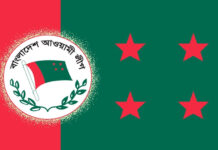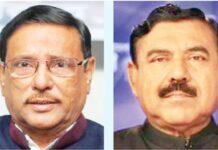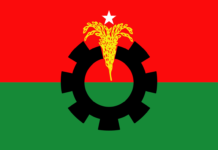Sadeq Khan
By creeping measures undeterred by political or civil society outcries, the impugned tenth parliament obtained by a boycotted and manipulated ritual of Election Commission exercise and its unrepresentative “unity” government by Sheikh Hasina with hand-picked loyals both from Treasury and feigned Opposition Benches (mostly declared elected unopposed by coercing or buying out of contest “unreliable” aspirants who were ready to take advantage of the boycotted election ritual) are chopping down the democratic fabric of the state structure.
The Supreme Court Judges, widely perceived to be awed and tamed already by overt and covert blackmail of authoritarian Executive power, now face the Damocles’ Sword of parliamentary impeachment under a Sixteenth Amendment Bill approved by Sheikh Hasina’s cabinet.
The Fifteenth Amendment passed in her preceding tenure as Prime Minister had introduced too many contradictory provisions to confound the democratic spirit of the Constitution, particularly complicating the process of smooth transmission of power as practiced since the retrospective effect of the consensual Twelfth Amendment and later-introduced Thirteenth Amendment, now nullified. The resulting continuous political unrest and extreme polarisation of power politics in this country, combined with criminalisation of political authority and police administration at various levels have created a suffocating climate of disorder with rampant extortions, muggings, kidnappings, contract murders, “cross-fire” killings and mafia terror simultaneously from criminal, political and extra-judicial intents.
No rule of law exists
There is no rule of law, not even minimal governance surviving the systematic subversion of the state institutions by the neo-Baksalites in power. There are only wilfully modified rules of business that succeeded in enforcing a Prime Ministerial dictatorship freely granting virtual impunity from prosecution to loyal mafia godfathers, and allotting subordinate tyrannical fiefdoms to Members of Parliament over their constituencies and rent-seeking turfs to crony capitalists over commerce, industry and services of any kind anywhere in the country.
To protect such mafia anarchy and police raj, Sheikh Hasina’s “unity” government of the impugned tenth parliament has now come up with cabinet approval for a “National Broadcast Policy”, gazetted on August 6, to muzzle the electronic media, negating its own past rightful law-making in the form of Right to Information Act 2009 and Whistleblower Protection Act, 2011. The government now is too eager to protect itself from any adverse publicity by controlling right to information of any probing citizen and by nipping any potential whistleblower in the bud. Not only the political opposition but also civil society members, irrespective of their attachment to either side of the sharply divided polity, have reacted with horror.
Dr. Iftekharuzzaman, Executive Director of the Bangladesh Chapter of Transparency International, the transnational anti-corruption crusaders, has questioned the Policy as prompted by presumption of “End of History”. He noted that the so-called National Broadcast Policy “contains many provisions that are subject to such risk of motivated, subjective and arbitrary interpretations that it may turn out to be a convenient tool to restrict free flow of information, media freedom, and freedom of expression, thought and opinion as enshrined in the Constitution. The policy appears to be a brainchild of those who are intolerant of media freedom and critical views. It speaks of a mindset that either you are with us or with our enemies. It undermines the fact that freedom of information and free media are the key to checks and balances indispensable for democratic accountability.
NBP: Govt’s own Frankenstein
For those who have pushed it through it seems that the history is going to end here. The government appears to have been motivated by short term priorities so as to present itself a tool to promote parochial interests. As a result, it has the risk of eventually turning into its (the government’s) own Frankenstein if and when it lands in the hands of political opponents.
Leaving wide options for subjective and politically motivated interpretations, the policy provides that views affecting the interest of the public and the country cannot be broadcast. Broadcast of speech of the heads of the state and the government has been made mandatory, whereas no such provision has been made for opposition leader, a position of high importance in a democratic society. On the other hand, it prevents broadcast of anything that may be deemed harmful to political sentiments, a provision that can be subjectively used as per convenience.
It stipulates that no information can be disclosed that may tarnish anyone’s personal image, which may facilitate interpretation of disclosure of a corrupt activity or abuse of power to affect the image of the individual concerned. The policy practically imposes a ban on reporting acts of sedition, anarchy and destructive events that may affect public interest. This may imply that people will have no right to know or to express opinion on such phenomena even when they have occurred.
“Equally inexplicable is the provision that no information, campaign, picture or opinion can be broadcast that may adversely affect Bangladesh’s relations with a friendly state. This may open the scope of practical blackout of information and opinion on such matters as border killing and other cross-border issues.
“With regard to the effectiveness of the proposed independent Broadcast Commission, ….. it stipulates that the Commission may recommend to the government on matters related to broadcast license, without articulating whether and under what circumstances the Commission’s recommendation can be overruled by the government. This practically leaves licensing authority in the hands of the government. Another blanket provision of control is that the government retains authority to decide on any matter not included in the policy…… “(Thus) although the policy is about broadcast and media, it will affect access to information and freedom of expression of practically all institutions and individuals.”
Electronic media turning biased
Likewise, Dr. CR Abrar of Dhaka University International Relations Department and also President of the prominent Rights Activists organisation, Odhikar, bluntly exposed the ill motives of the government behind the move in the following lines: “Weighed down by misinformation propagated by the state-run channels and a section of private channels, another section began drawing interest of the politically conscious citizenry of the country. The discussion sessions, the so-called talk-shows, hosted by these channels provide a refreshing setting, particularly for those who are hungry for reflection and analysis of events as and when they occur.
“A powerful few find the talk-shows ‘tawk’ (sour) and have candidly voiced such feelings. The administration, therefore, has opted to bring in line those channels that respond to the market forces, i.e., popular demands for unbiased reporting and differing perspectives. Hence, its insistence on streamlining the contents of the news and talk-shows. The inclusion of the provision to include government programmes mandatory for private channels will invariably result in those channels meeting the same fate as that of Bangladesh Television and Radio, losing credibility and audience and their trust. So instead of helping the electronic media to prosper, the administration is on course to incapacitate them. Its final goal is to ensure pervasive conformism.
“One does not have to be a sage to realise that media control can lead to catastrophic consequence for the political leadership.
“Successive authoritarian administrations in this country learnt the hazards that lay in taking such a path. It leads to a plethora of freedom-curbing anti-democratic policies and further alienation of the rulers from the ruled. One wonders if the current administration is wittingly treading that path or not.”
Instant impact of the declared National Broadcast Policy, notwithstanding strong objections from the civil society and political opposition, is already evident in TV coverage. The sharply critical “talk shows” are vanishing from the TV screens, replaced by goody goody exchanges of feeble appreciation.
Signs of nervousness showing
The news-coverage of the massive crowd that gathered in Suhrawardy Udyan on 19 August daunting incessant rains to hear the opposition 20-party alliance leaders (their supremo Begum Khaleda Zia was unwell and absent) was snapped off the TV screens after only seconds of broadcast before the TV audience could comprehend the extent of burgeoning attendance and public response to the opposition cries for concerted agitation for the downfall of the “illegitimate regime.”
Some analysts and commentators have detected in the latest authoritarian moves by the government a sign of growing “nervousness” of the ruling party leaders on account of patent alienation of the people, as demonstrated by very poor public response to this year’s regular and occasional events of the “Month of Mourning” observed and organised by ruling party organs throughout the country. The contrast of public response to the opposition 20-party alliance’s rally in drenching rains with or without umbrellas on August 19 was glaring indeed.
And in a news-commentary, reporter Khademul Islam noted: “Experts and rights activists observe apparent desperation of the Awami League and its partners that appears to have reached a climax, as the sham January 5 election failed to win national and international recognition as yet. They believe that the attempts to curb the independence of the judiciary and democratic freedom of the media might not save the day for the incumbents. In a bid to impose partisan control over the higher judiciary, Sheikh Hasina has taken a number of steps, including framing of broadcasting policy, drafting an online media policy, restoring parliament’s power to impeach Supreme Court judges and amending the Printing Presses and Publications (Declaration and Registration) Act of 1973. Experts said that the government, isolated as it was from the people and desperate to cling to power without a popular mandate, now only depended on warranted control of the democratic space for free thought and expression.”
Such a diffident administration is bound to succumb to the test of time under the stress of public disaffection.
Source: Weekly Holiday










Without people’s mass participation and the support of the law enforcement personnel, no change will happen. Awami government will take rapid actions to confine opposition leaders to spoil the movement. Therefore, opposition also needs to move fast. Mr Bakul’s comments are correct in this video but government will not let that happen. https://www.youtube.com/watch?v=LtCiId2Kf8Y
BNP has to be able to prove to people that qualitative change will happen if people actively takes part in the movement. This movement is not to re-instead BNP in power, in place of Awami League. BNP immediately needs to make real pledges about the good governance, democratic institution building, law and order, merit based appointments, selection process in the constitutional bodies, bureaucracy and law enforcing agencies and enter into a social contracts with all the participants of the movement. So that the movement can turn into a people’s revolution and people can guard each and every polling station at the time of vote even under Awami government. What might happen if Khaleda Zia says the following?
1. “I am asking all garment workers, Grameen Bank members, and victims of the share market scam to come out in the street and join the movement until this corrupt and illegitimate government bows down to the popular demand of holding a fair and credible election under a neutral government. I am giving you assurance that the next government, elected by the people, will recover all the money siphoned from the banks, share market, Hallmark, Destiny etc and got deposited in foreign banks will be brought back to the country and be used to compensate you all as much as possible. Fair financial, industrial and workplace safety will be ensured in garments. Grameen Bank will get back its past glory and religious leaders and followers will be treated with respect. Rule of law, merit and social justice will be established in all walks of life and professions.”
2. ” I am asking all in the bureaucracy, law enforcing agencies and other institutions who have been deprived by this anti-people government, which only pleased and let its party cadre to build their fortunes at the cost of the nation and the institutions, to come out and join the people’s movement for democracy and good governance. All will be properly compensated once the people’s victory over the current injustice is achieved. Criminals in these agencies will be put into fair trial for their killings and corruption.”
3. “I am particularly asking the real freedom fighters and the youths, who have been deprived despite their rights and merit in order to accommodate the party cadres and thugs in jobs with false certificates in all sectors, to come out and join the street movements to establish the true spirit of liberation – democracy, freedom of speech and social justice for all.”
4. “I am asking the democracy loving people of Bangladesh irrespective of religion, age, profession and political orientation to join the movement to establish their voting right and a government of their choice without any delay. No one will return home until this unelected and oppressive government agrees to hand over power to a neutral government.”
The following may be selected as the theme songs of the movement:
https://www.youtube.com/watch?v=OIo1iVXRako
https://www.youtube.com/watch?v=E7EagWehJ3o
https://www.youtube.com/watch?v=zhZEkT33th0
https://www.youtube.com/watch?v=DJ0_izfqn3k
https://www.youtube.com/watch?v=qGmAXMm8uo0
https://www.youtube.com/watch?v=e1uqr4NB3Fw